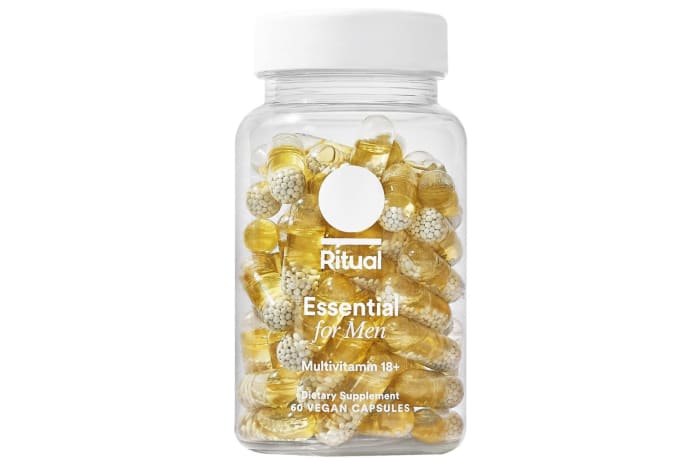The products featured in this article have been independently reviewed. When you buy something through the retail links on this page, we may earn commission at no cost to you, the reader. Sports Illustrated editorial staff are not involved in the creation of this content. Learn more here.
Vitamins and minerals, also known as micronutrients, are essential compounds that our bodies need to properly function. While most of them can be obtained from your diet, some people choose to supplement with them to ensure their nutrient needs are being met. Although vitamin supplements are generally well tolerated, mild side effects such as nausea are not uncommon.
This may leave you wondering, why do vitamins make me nauseous? In this article, we’ll delve into the details of vitamin-associated nausea, including the top culprits, some ways to prevent it and even a few of our favorite multivitamin supplements.
Benefits of Vitamins
Our bodies require 13 essential vitamins to properly function, nine of which are water soluble (folate, thiamine, riboflavin, niacin, pantothenic acid, biotin, vitamin B6 and vitamin B12) and four of which are fat soluble (vitamins A, D, E and K). Fat-soluble vitamins require fat for absorption, whereas water-soluble vitamins do not.
Thankfully many of the foods we eat are loaded with micronutrients (think: fruits and vegetables). Even so, it’s not uncommon to have some nutrient gaps in your diet; this is where supplements come in.
Certain populations in particular—such as growing children and adolescents, athletes, pregnant or nursing people and elderly individuals—will likely benefit most from vitamin and mineral supplements.
The top benefits of supplementing with vitamins in these populations include:
- Preventing deficiencies of certain nutrients
- Optimizing energy levels
- Maintaining bone health
- Supporting growth and development
It’s important to note that vitamin supplements will vary depending who they are designed for. For example, prenatal vitamins contain more iron and folate for healthy fetal development.
Why Do Some Supplements Cause Nausea?
While most supplements are well tolerated by most people when taken as directed, there are a handful of supplements that have a tendency to cause nausea at times.
Multivitamins
Multivitamins are a common culprit when it comes to supplement-related stomach upset. With many containing over 25 different vitamins and minerals, it’s no wonder that some people get a bit queasy when taking them.
The most common reason for getting nauseous after taking a multivitamin is taking it on an empty stomach. Many vitamins and minerals are acidic and have an irritating effect on the stomach lining, potentially causing reflux or excessive acid production. They may also contain individual ingredients that cause an upset stomach. A simple fix for this is simply to take your multivitamin with a meal. That way, the other food in your stomach can serve as a buffer.
Iron
Iron is an essential mineral used to make hemoglobin, a major component in the red blood cells that carry oxygen throughout the body. While most people get enough iron through food, some people who are at risk of being deficient supplement with it.
Iron supplements are known to have a risk of causing digestive side effects such as stomach pain, constipation and dark stools. To help prevent these symptoms, stick with the ferrous gluconate form of iron and take it with a small amount of food. Additionally, some research suggests taking iron with vitamin C can help improve absorption.
Vitamin C
Vitamin C is a water-soluble vitamin that plays a role in numerous processes throughout the body including the synthesis of collagen and certain neurotransmitters. Although it’s abundant in various fruits and vegetables we eat, some people supplement with it at times.
When consumed in over-abundance, vitamin C can have an irritating effect on the upper digestive tract due to its high level of acidity, resulting in potential side effects such as nausea, indigestion, heartburn or abdominal cramps. This is best avoided by taking vitamin C with a meal or snack to help buffer its acidity.
Fish Oil
Fish oil is a concentrated form of omega 3s, a beneficial type of fat that helps form the cell membranes of cells throughout the body and promotes heart health. These are found in fatty fish such as salmon or mackerel, though they are also often taken in supplement form.
Considering they are derived from fish, these supplements have a tendency to cause a fishy aftertaste or nausea when supplemented. To counteract these, some companies make fish oil capsules with a special “enteric” coating that helps prevent them from dissolving in the stomach, which can prevent the aftertaste. Alternatively, they can be taken with food.
Can I Take All My Vitamins at the Same Time?
Generally speaking, most vitamins and minerals are safe to take all at once, although this will vary depending on exactly which ones you choose to supplement with. Certain vitamins and minerals interact with each other and therefore should be taken separately. The most common examples of this include:
Iron and calcium: Research shows that high calcium foods greatly blunt the absorption of iron in the digestive tract. Therefore if you take both an iron and calcium supplement you’ll want to space them out to optimize absorption.
Zinc, magnesium and calcium: While these are all important minerals in the body, they shouldn’t be taken together as they compete for absorption.
Vitamin C and vitamin B12: When taken together, vitamin C may reduce the absorption of vitamin B12; it's best to take them separately.
If you have a particularly sensitive stomach it’s best to space your supplements out throughout the day for best results.
Our Favorite Vitamins
Not all vitamin brands are created equal. Here are our favorite multivitamin supplements, vetted by our review team.
Best Vitamin for Women: Ritual Multivitamin for Women
Get 25% off your first month of Ritual! Code: SI25
Ritual’s Essential Multivitamin for Women is a unique blend of essential vitamins and minerals that cater specifically to women’s health. Instead of using an umbrella approach by providing a slew of vitamins and minerals, it supplies only the ones that are most impactful.
Best Vitamin for Men: Ritual Multivitamin for Men
Get 25% off your first month of Ritual! Code: SI25
Ritual’s Multivitamin for Men, like its version for Women, supplies only specific nutrients that have been shown to benefit men’s health including boron, magnesium and vitamin D. As an added plus, Ritual multivitamins supply plant-based omega-3s to boost your intake of healthy fats.
Best Vitamin for Active People: Transparent Labs Multivitamin
Transparent Labs Multivitamin is a high-dose, full-spectrum vitamin and mineral supplement that provides well over the daily value for many nutrients. This makes it a great option for high-performing athletes that demand a lot from their bodies.
Best Vitamin for Immune Health: Swolverine Multivitamin
Swolverine’s Multivitamin provides a blend of over 28 vitamins and minerals, including iron, an important mineral that many multivitamins don’t include. Coming in at around $0.66 per serving, this multivitamin provides an exceptional value while only requiring two capsules daily.
FAQs About Vitamins
How long does it take for your body to adjust to vitamins?
While this will depend on the specific vitamin or mineral, most people will adjust within a week or two. If you continue to experience any sort of side effects, including nausea, it’s best to seek guidance from a health professional such as a registered dietitian or doctor.
What happens if you take vitamins on an empty stomach?
Taking vitamins on an empty stomach is the number one reason people experience side effects, with one of the more common ones being nausea. Therefore, if possible, most vitamin and mineral supplements should be taken with food unless you are instructed otherwise.
When is the best time to take vitamins?
Although there is not necessarily an optimal time to take vitamins, some experts recommend taking them in the morning with your first meal of the day. That said, if you find it more convenient to take them later in the day it shouldn’t impact their effectiveness.
Related Post: Best Time to Take Vitamins
What vitamins do you not take together?
Although most vitamins and minerals can be taken together there are a few that you should avoid combining. These include: iron and calcium; zinc, magnesium and calcium; as well as vitamin C and B12.
How do you stop nausea fast?
A good first line of defense when it comes to nausea is an over the counter medication such as bismuth subsalicylate (Pepto Bismol). From there, ensure you are well hydrated and avoid any heavy foods. Sit or lay down until the feelings of nausea subside, avoiding any sudden movements. If the nausea persists it's best to seek medical attention.
Final Thoughts
Vitamins and minerals are an essential part of our health, serving countless functions throughout our bodies. Although most of your vitamins and minerals should come from the foods you eat, supplementing with them can have a number of benefits for certain populations. Even so, some people experience side effects when taking them. The most common side effect associated with vitamin supplements is nausea, which is often resolved by simply taking them with a meal instead of on an empty stomach. If you consistently experience nausea when taking a supplement and nothing seems to help, it's best to consult a healthcare provider for further guidance.
Prices are accurate and items in stock as of publish time.













